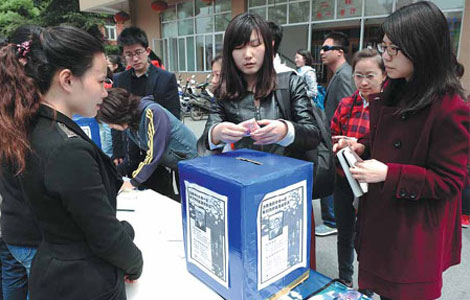Well-known hot-pot restaurant involved in fake lamb scandal
Updated: 2013-05-06 15:24
By Mao Jing (Chinadaily.com.cn)
|
|||||||||||
Tainted lamb products have been used in well-known hot-pot restaurants such as Little Sheep, Macao Hot Pot and Dai Mei, Liberation Daily reported.
High prices and the scarcity of lamb has led to serious market fraud, and the rising cost of hospitality has also prompted some companies to take the risk of using adulterated meat, a staff member in charge of a well-known lamb food company told CBN Daily.
Recently, P-SHANG Dolar in Zhou Pu District, Shanghai, was accused of selling fake lamb. An employee admitted that only part of its products were real lamb meat and told the reporter that they purchased these pieces of meat from Shanghai Xin Pin wholesale market.
Shanghai Commerce and Industry Bureau and Shanghai Food Safety Office made a spot check on the Xin Pin wholesale market and found a large amount of so-called “New Zealand lamb rolls” that were labeled as Yuxuanzhai in a storeroom named “International Animal Husbandry Union of Frozen Goods”. But there is no production date or a list of ingredients, nor manufacturers’ information on these products.
According to Liberation Daily, shipping notes found at the site show that the lamb products have gone to many well-known hot-pot restaurants including “Little Sheep” acquired by Yum! Brands.
“The internal process of Little Sheep has been standardized. The management has been greatly improved, especially after being acquired by Yum! Brands. So it is unlikely that it would use substandard products,” an insider said.
“Lamb meat is at least 120 yuan per kilogram normally, but the adulterated lamb meat can be sold at 20 to 60 yuan per kilogram, which has a severe impact on the regular lamb market. A number of orthodox manufacturers had to close their doors,” said a staff member of a chain restaurant serving lamb meat.
“There are mainly three kinds of meat that is used in lamb adulteration: cattle, pig and duck meat; sick poultry meat; mice, fox and other non-common meat. The latter two kinds are harmful to human beings,” he said.
The reason for the repeated fraud in the lamb meat market is the high price of lamb and scattered and small mutton processing companies which make it very difficult to supervise. Due to the temptation of high profits and rising demand, many vendors have taken the risk of joining the fraud army, an insider said.
Lamb meat identification needs certain DNA technology, and it’s impossible for ordinary consumers to identify it with their eyes, which leaves a loophole for lawbreakers, an expert from Shanghai Quality Supervision Bureau said.
Today's Top News
Renewed interest in mission to Mars
Suspects accused of selling tainted pork
Xi pins hope on youth for innovation, advancement
China playing bigger role in Middle East
FM wraps up tour on
note of stability
Museum window vandalized
Seawater can save thirsty country
New markets buy big at trade fair
Hot Topics
Lunar probe , China growth forecasts, Emission rules get tougher, China seen through 'colored lens', International board,
Editor's Picks

|

|

|

|

|

|





